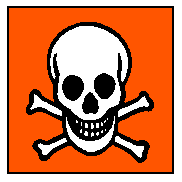International Chemical Safety Cards
| TRI-o-CRESYL PHOSPHATE | ICSC: 0961 |
TRI-o-CRESYL PHOSPHATE |
 |
| TYPES OF HAZARD/ EXPOSURE |
ACUTE HAZARDS/ SYMPTOMS |
PREVENTION | FIRST AID/ FIRE FIGHTING |
| FIRE | Combustible. Gives off
irritating or toxic fumes (or gases) in a fire. |
NO open flames. |
Powder, water spray, foam,
carbon dioxide. |
| EXPLOSION | |
|
|
| EXPOSURE | |
STRICT HYGIENE! |
IN ALL CASES CONSULT A DOCTOR! |
| INHALATION | Headache. Nausea. Vomiting.
Muscular pain. Symptoms may be delayed (see Notes). |
Local exhaust or breathing
protection. |
Fresh air, rest. Refer for
medical attention. |
| SKIN | MAY BE ABSORBED! Redness. Pain
(Further see Inhalation). |
Protective gloves. Protective
clothing. |
Remove contaminated clothes.
Rinse skin with plenty of water or shower. |
| EYES | |
Face shield, or eye protection
in combination with breathing protection. |
First rinse with plenty of water
for several minutes (remove contact lenses if easily possible), then take to a doctor. |
| INGESTION | Abdominal pain. Nausea. Vomiting
(further see Inhalation). |
Do not eat, drink, or smoke
during work. |
Induce vomiting (ONLY IN
CONSCIOUS PERSONS!). Refer for medical attention. |
| SPILLAGE DISPOSAL | STORAGE | PACKAGING & LABELLING | ||
| Collect leaking liquid in
sealable containers. Absorb remaining liquid in sand or inert absorbent and remove to safe
place (extra personal protection: complete protective clothing including self-contained
breathing apparatus). |
Separated from strong oxidants,
food and feedstuffs. |
Do not transport with food and
feedstuffs. T symbol R: 23/24/25-39 S: (1/2)20/21-28-45 Note: C UN Hazard Class: 6.1 UN Packing Group: II Marine pollutant. |
||
| SEE IMPORTANT INFORMATION ON BACK | ||||
|
||||